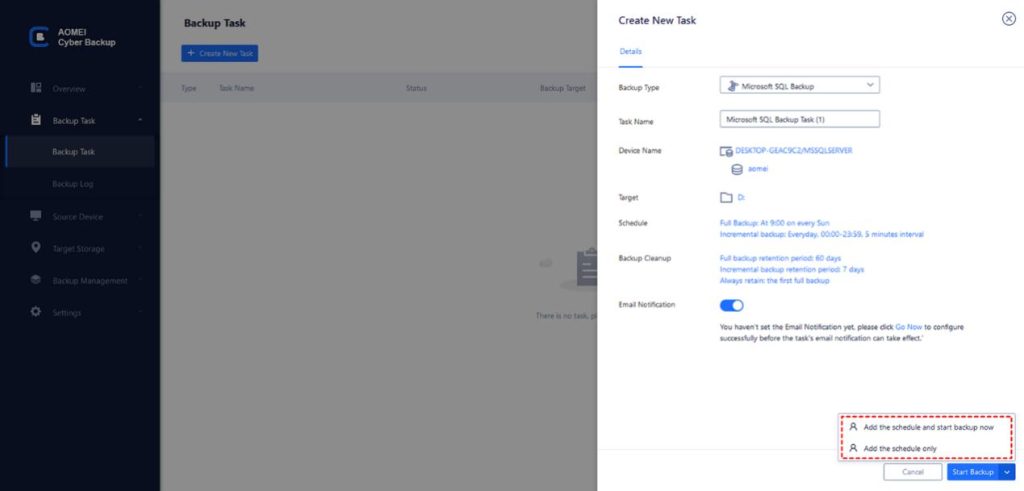Data is considered essential for any organization. Therefore, maintaining the integrity of the organization and its availability is extremely important, especially for SQL databases. The risks associated with data loss are the worst nightmare for business owners, and without regular backups, those risks only multiply.
Table of Contents
Potential Risk of Failing to Perform SQL Backup
- Data loss: Irreplaceable data may be lost due to hardware failure, human error, or malicious attacks.
- Downtime: When data is lost, it results in significant downtime, leading to financial losses and damage to the company’s reputation. Recovering data from backups can help reduce downtime, allowing businesses to resume operations quickly.
Factors to Consider When Choosing SQL backup Solution
To ensure effective data protection, selecting the appropriate SQL database backup strategy is essential. Consider the following factors:
- Backup frequency: Assess the frequency of data changes within your organization. A higher rate of data change may require more frequent backups to reduce the risk of data loss.
- Storage options: Evaluate the advantages and disadvantages of both on-premises and cloud storage options. On-premises storage offers more control, while cloud solutions provide greater accessibility and backup capabilities.
- Scalability: Ensure that the backup strategy you choose can accommodate increasing data volumes. Consider the future growth of your organization and select a solution that can adapt and expand accordingly.
- Testing: Regularly test and verify the integrity and usability of your backups. Conduct recovery tests to ensure that your backups are reliable and complete.
Free Tool: AOMEI Cyber Backup for SQL Server
AOMEI Cyber Backup offers a reliable solution for MSSQL backup, serving as a centralized backup and management solution for all SQL instances and virtual machines within the LAN. It supports SQL versions 2005-2022, allowing you to easily back up selected databases to a network location.
- Automated Backup Scheduling: One of the standout features of AOMEI Cyber Backup is its ability to schedule automated backups. You can set it to back up your SQL Server databases at regular intervals, ensuring that your data is always up to date without manual intervention.
- Flexible Backup Options: AOMEI Cyber Backup supports full, incremental, and differential backups, allowing you to choose the best strategy for your needs. Full backups capture everything, while incremental and differential backups save time and storage space by only backing up changes since the last backup.
- Centralized Management: If you want to backup multiple database SQL Server, AOMEI Cyber Backup’s centralized management console will be invaluable. It allows you to monitor and manage all your backups from a single interface, making it easier to maintain oversight and control.
- High-Speed Backup and Restore: AOMEI Cyber Backup is optimized for speed, ensuring that even large databases can be backed up and restored quickly. This minimizes downtime and ensures that your business can continue to operate smoothly.
- Secure Storage: AOMEI Cyber Backup offers flexible storage options such as local, network and cloud, ensuring that your backups are secure.
- Cost-Effective Solution: Unlike many enterprise-level backup solutions, AOMEI Cyber Backup offers a range of pricing options that make it accessible to businesses of all sizes. It delivers high-end features without the high-end price tag, making it a smart investment for any organization.
How AOMEI Cyber Backup Simplifies SQL Server Backup
1. Install AOMEI Cyber Backup and the agent. Once installed, connect AOMEI Cyber Backup to your SQL Server instance.
2. Create a new backup job and select the Microsoft SQL Backup as the backup type.
- Device Name: Select SQL instance and database for backup. You can choose the number of databases you want to backup according to your needs.
- Backup Target: Specify a local path or network path as backup target. To back up SQL database to remote location, you could click Add a new network storage. The added path will be saved in Add storage.
- Backup Target: Specify a local path or network path as backup target. To back up SQL database to remote location, you could click Add a new network storage. The added path will be saved in Add storage.
- Backup Cleanup: Help you to delete older backup version automatically and therefore save storage space.
Email Notification: Enable you to receive email notifications when the task is abnormal or successful.

Conclusion
To protect your organization’s data, proper SQL database backups are essential. By understanding potential risks, considering key factors, and following step-by-step guidelines, you can implement an effective backup strategy. Additionally, using a reliable backup solution like AOMEI Cyber Backup will enhance your data protection efforts. Take action now to safeguard your SQL database and ensure your business continuity. Don’t let your valuable data be at risk.
Leave a Reply